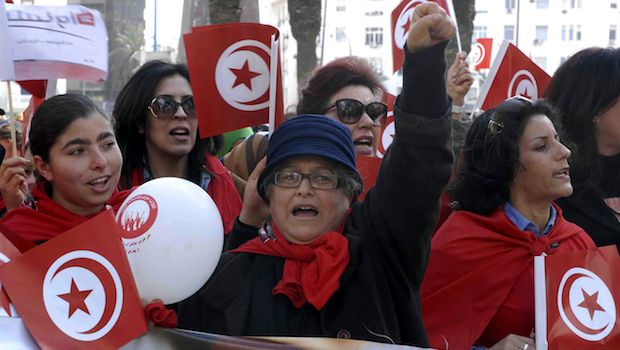
Tunisian women hold national flags as they take part in a march marking International Women’s Day on March 8, 2014, in the capital, Tunis. (AFP Photo/Fethi Belaid)
London, Asharq Al-Awsat—As the Middle East joins the rest of the world in celebrating International Women’s Day, much attention will be paid to the ongoing human rights issues in the region.
Of course, as with the rest of the world there are still many gains to be made with regard to women’s rights, and there is still widespread focus on women’s rights issues in the Middle East.
International attention has turned once again to the issue of female genital mutilation (FGM) in some communities, including in Egypt and Sudan, with several civil society organizations and prominent activists such as Pakistan’s Malala Yousafzai launching campaigns to end FGM not just in the Middle East, but around the world.
Child marriage was also brought to the world’s attention, with the UK’s justice minister citing examples from Yemen in a speech ahead of this year’s Women’s Day calling for as much effort to be made in eradicating child marriage as is being put toward ending FGM.
And, as in any conflict zone, the situation for women in Syria and other violence-ridden areas in the region remains dire. Human rights groups have been particularly concerned about the rate of sexual violence against women during the Syrian crisis, with more than 6,000 women reporting rapes in the first year of the conflict alone, as well as a lack of access to food and medical care both within Syria and in refugee camps abroad.
But despite the slow pace of social change in this region, some gains have also been made. Here, Asharq Al-Awsat marks International Women’s Day by taking a look back at some of the stories on women and women’s rights we’ve brought you over the past year:
In Iraq, more than 3,000 female candidates are expected in the legislative elections scheduled for April 30, the largest number of women running for parliament ever in the country. At the same time, however, a new Personal Status Law making its way through parliament could significantly curtail women’s rights, and a law regarding protection against family violence has also been repeatedly stalled on its way through parliament.
The situation for women in Syria has worsened dramatically as the war there enters its fourth year. One year ago, Asharq Al-Awsat reported on some of the first women to enter the war as rebel combatants. A year later, women continue to be disproportionately affected by the violence both at home and as refugees abroad.
In Palestine, Hamas appointed its first female English-language spokesperson, the UK-educated Israa Al-Mudallal.
Not all was bright for women in Yemen this year, but women did make up a third of delegates to the National Dialogue Conference that ended in February. In addition, increased international attention on child marriage following a string of high-profile underage marriages may see more change to come.
Kuwait opened its first sports clubs for women in May 2013, following the success of Arab women at the London 2012 Olympics. But, following women gaining the right to stand for election to the parliament in May 2005, participation by women in politics declined to their lowest level since 2005 during July’s parliamentary elections.
From Iran, we spoke with prominent women’s rights activist Fazaeh Hashemi, who also founded Iran’s first women’s newspaper. While she admitted women have a long way to go to gain equality in Iranian society, the election of Hassan Rouhani as president last summer seems to have renewed hope that the situation may soon change.
While not perfect, Egypt’s new constitution, adopted earlier this year, made gains in women’s rights, most prominently through an article saying the state must protect women from violence. The head of the drafting committee, Amr Moussa, told us that under the new constitution, a woman could become president. Egypt also saw its first woman elected head of a political party this year, with Coptic Christian Hala Shukrallah taking the helm of the Al-Dustour party.
Tunisia, long at the vanguard of women’s rights in the Middle East, also included an equality clause in the constitution adopted earlier this year. October saw the first woman ever to be put forward for the post of prime minister, and the new cabinet formed earlier this year included three women ministers.
Morocco notably strengthened women’s protection against sexual violence in January by amending its criminal code. On its culture scene, a number of women are making a name for their sculpture. They were celebrated at a recent exhibition in Marrakesh.
In Saudi Arabia, there has been a surge in women taking jobs and starting businesses. Saudi women are also entering government, with the first women taking their seats in the Shura Council in February 2013 and the first female candidates for municipal elections set to run next year.
A number of international events have also celebrated the accomplishments of women in the Arab world. Last June in London, Arab women business leaders gathered to celebrate their successes and discuss ways to improve their sitation in the future. Eight Arab women were also celebrated in 2013 for their role as journalists covering wars and other violent conflicts
